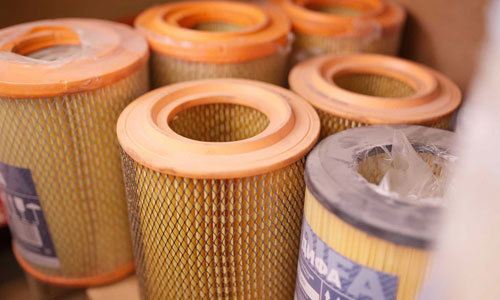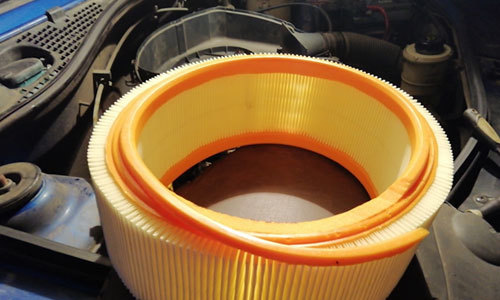Cylindrical Air Filters: Essential Components for Optimal Machinery Performance and Maintenance
2025-08-18
Cylindrical Air Filters: A Key Component in Machinery Maintenance
Table of Contents
1. Introduction to Cylindrical Air Filters
2. Importance of Air Filters in Machinery
3. Design and Functionality of Cylindrical Air Filters
4. Types of Cylindrical Air Filters
4.1. Paper Filters
4.2. Foam Filters
4.3. Synthetic Filters
5. In
Cylindrical Air Filters: A Key Component in Machinery Maintenance
Table of Contents
- 1. Introduction to Cylindrical Air Filters
- 2. Importance of Air Filters in Machinery
- 3. Design and Functionality of Cylindrical Air Filters
- 4. Types of Cylindrical Air Filters
- 5. Installation of Cylindrical Air Filters
- 6. Maintenance Practices for Longevity
- 7. Troubleshooting Common Issues
- 8. Conclusion
1. Introduction to Cylindrical Air Filters
Cylindrical air filters serve as a **critical component** in various types of machinery, ensuring that air entering the system is clean and free of contaminants. Their role is not merely supportive; it is vital for the efficient operation and longevity of equipment. While many in the industry recognize the importance of air filters, the specifics of cylindrical air filters often remain underappreciated. This article delves deep into their importance, design, types, and maintenance practices.
2. Importance of Air Filters in Machinery
Understanding the significance of air filters in machinery maintenance can enhance operational efficiency. Contaminated air can lead to various mechanical issues, such as reduced performance, increased wear and tear, and even catastrophic failures. By filtering out dust, dirt, and other particles, cylindrical air filters play a crucial role in:
- **Preventing Engine Damage**: Contaminants can cause significant damage to engine components, leading to costly repairs.
- **Enhancing Performance**: Clean air improves fuel efficiency and overall performance.
- **Reducing Maintenance Costs**: Regularly replacing or cleaning air filters can extend the life of machinery, ultimately saving money.
3. Design and Functionality of Cylindrical Air Filters
Cylindrical air filters are designed to maximize surface area while minimizing airflow resistance. Their structure typically includes a cylindrical frame made from a durable material that houses a filtering element, which captures particulates. This design offers several advantages:
- **Increased Filtration Surface Area**: The cylindrical shape allows for a larger area to trap contaminants while maintaining airflow.
- **Efficient Airflow Dynamics**: The design facilitates smoother airflow, reducing strain on machinery and improving efficiency.
- **Durability and Longevity**: Constructed from robust materials, cylindrical air filters can withstand high pressure and varying temperatures.
4. Types of Cylindrical Air Filters
Cylindrical air filters come in various types, each suited to specific applications and operating conditions. Understanding these types can help in selecting the right filter for your machinery.
4.1. Paper Filters
Paper filters are the most common type of cylindrical air filter. They are made of cellulose and synthetic fibers, providing excellent filtration capabilities.
- **Benefits**: They are cost-effective and provide high filtration efficiency.
- **Limitations**: They are not washable and need to be replaced regularly.
4.2. Foam Filters
Foam filters consist of a porous foam material that can be reused after cleaning.
- **Benefits**: They offer great airflow while providing decent filtration. They are washable and reusable, making them eco-friendly and cost-effective in the long run.
- **Limitations**: Foam filters may not capture as small particles as paper filters.
4.3. Synthetic Filters
Synthetic filters are made from man-made fibers and often combine properties of both paper and foam filters.
- **Benefits**: They offer excellent filtration performance, longer service life, and are typically washable.
- **Limitations**: They can be more expensive than traditional paper filters.
5. Installation of Cylindrical Air Filters
Proper installation of cylindrical air filters is essential to ensure optimal performance and longevity. Here are some steps to follow during installation:
- **Ensure Compatibility**: Verify that the filter matches your machinery's specifications.
- **Clean the Housing**: Before installation, clean the filter housing to remove any accumulated dust and debris.
- **Check Seals and Gaskets**: Inspect and replace any worn seals or gaskets to prevent air leaks.
- **Follow Manufacturer Guidelines**: Always refer to the manufacturer’s instructions for the correct installation process.
6. Maintenance Practices for Longevity
Regular maintenance of cylindrical air filters is crucial for ensuring that machinery operates efficiently. Here are some recommended practices:
- **Regular Inspection**: Inspect filters at recommended intervals for signs of wear, clogging, or damage.
- **Cleaning or Replacement**: Depending on the type of filter, clean or replace filters according to the manufacturer's recommendations. Paper filters should be replaced, while foam filters can be washed.
- **Monitor Performance**: Keep an eye on machinery performance. A noticeable drop in performance may indicate a clogged filter.
- **Environmental Conditions**: Consider the environment where the machinery operates; areas with high dust or pollutant levels may require more frequent maintenance.
7. Troubleshooting Common Issues
Even with regular maintenance, issues can arise with cylindrical air filters. Here are some common problems and their solutions:
- **Reduced Performance**: If machinery performance drops, check the air filter for clogging or contamination. Cleaning or replacing the filter often resolves the issue.
- **Unusual Noises**: Unusual sounds from machinery may indicate insufficient airflow due to a blocked filter. Inspect and rectify the issue immediately.
- **Increased Emissions**: High emission levels can be a sign of a dirty or damaged air filter. Addressing the filter issue can often reduce emissions.
8. Conclusion
Cylindrical air filters are essential components in the maintenance and operation of various machinery. Their role in filtering contaminants cannot be overstated, as they contribute significantly to the performance and longevity of equipment. By understanding the different types of cylindrical air filters, their installation, maintenance practices, and troubleshooting common issues, industry professionals can ensure that their machinery operates efficiently and effectively. Regular attention to air filter health will not only save costs in the long run but also enhance the overall reliability and performance of machinery.
FAQs
1. How often should cylindrical air filters be replaced?
Replacement frequency depends on the type of filter and operating conditions. Generally, paper filters should be replaced every 10,000 to 15,000 miles, while foam filters can be cleaned and reused.
2. Can I clean a paper air filter?
No, paper air filters are not designed to be cleaned. They should be replaced when they become clogged or dirty.
3. What are the signs that an air filter needs to be replaced?
Signs include reduced engine performance, unusual noises, and increased emissions. Regular inspections will help identify when a filter needs replacement.
4. Are synthetic filters worth the investment?
Yes, synthetic filters offer excellent filtration performance and a longer service life, often justifying their higher initial cost.
5. How can I improve the lifespan of my cylindrical air filter?
Regular maintenance, including inspections and timely replacements, and monitoring environmental conditions can significantly improve filter lifespan.
Key words:
Related News
How often does the air filter change?
The air filter element is mainly used to block impurities such as dust and sand in the air.
2024-05-22
What are the car filters? When do car filters need maintenance?
As an oil filter, it is generally replaced together with the oil during maintenance.
2024-05-22
The choice of filter manufacturers should be considered comprehensively
Before choosing a filter manufacturer, you must understand the relevant background of the manufacturer.
2024-05-22








